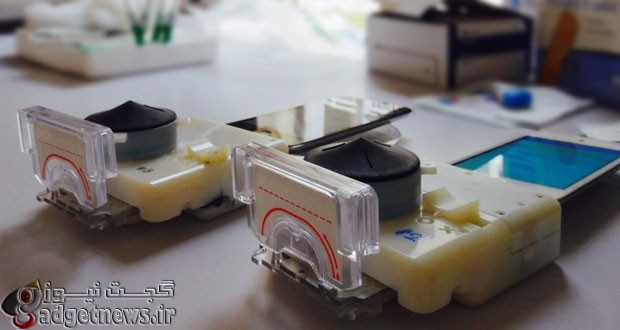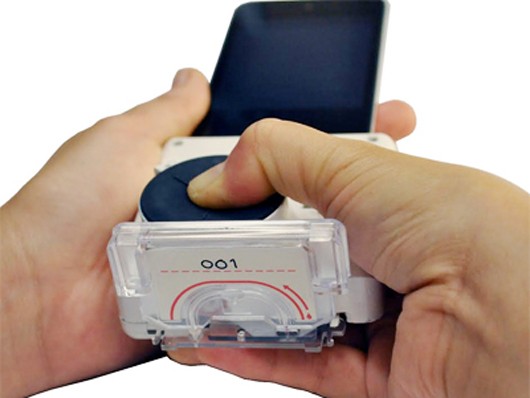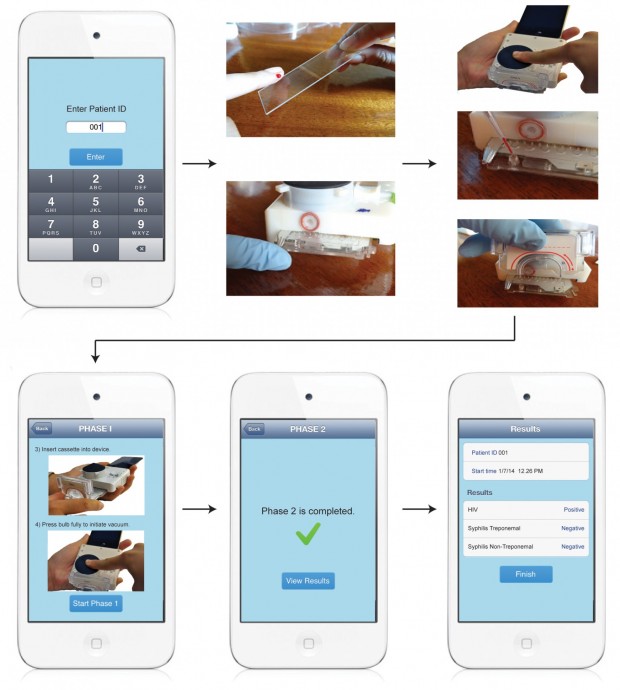به تازگی عده ای از متخصصان دانشگاه کلمبیا موفق به طراحی و ساخت دستگاه جانبی تلفن همراه شدند که می تواند در عرض ۱۵ دقیقه بیماری ایدز و سفلیس را تشخیص دهد.
نحوه کار دستگاه به این صورت است که با گرفتن یک قطره خون از انگشت، نشانگر بیماری در عرض ۱۵ دقیقه باشد. استاد یار بیو پزشکی به نام« ساموئل کی.سا » که سرپرستی این مطالعه را در دانشکده ی علوم کاربردی کلمبیا برعهده دارد، می گوید:
به وسیله ی این دستگاه می توان تمام عملکرد های نوری، مکانیکی و الکترونیکی که برای انجام یک تست خون در شرایط آزمایشگاهی لازم است را به خوبی انجام داد
این دستگاه به دلیل اینکه انرژی مورد نیاز خود را برای انجام تست خون از تلفن هوشمند دریافت می کند، دیگر نیازی به منبع ذخیره انرژی ندارد.
این وسیله ی جدید قادر به تشخیص هر دو بیماری ایدز و سفلیس می باشد و برای تحلیل داده ها می تواند به راحتی به تلفن هوشمند و کامپیوتر متصل شود.این دانگل اکنون در روآندا تحت آزمایش های اولیه است.
منبع : gizmag
Smartphone dongle detects HIV and syphilis markers in 15 minutes
Smartphone dongle detects HIV and syphilis markers in 15 minutes
That smartphones have evolved to be capable of much more than making and receiving calls isn’t news to anyone, but work being done to refashion them as medical diagnostics tools is proving to be a very promising area of mobile innovation. The latest big-picture idea to emerge in this area is a smartphone dongle capable of detecting three infectious disease markers within 15 minutes, requiring only a finger prick of blood.
As smartphone technology has developed over the years, it has paved the way for accessories designed to make healthcare more accessible in a variety of ways. Attachments to carry out ear examinations at home, snap ultrasound images and perform complex eye tests have all been part of the mix.
Now, a team of researchers from New York’s Columbia University have unveiled a cheap, plug-in smartphone accessory they say can detect both HIV and syphilis. More specifically, it uses disposable plastic cassettes loaded with reagents to detect HIV antibodies, treponemal-specific antibody for syphilis, and non-treponemal antibodies for active syphilis infection.
The researchers say the device can replace the traditional method of testing for such disease markers, a process called an enzyme-linked immunosorbent assay (ELISA) that involves equipment costing upwards of US$18,000. In comparison, they estimate the manufacturing cost of the accessory to be just $34.
Users mechanically activate a negative-pressure chamber that activate the reagents, elimin…
The key innovations that make the cheaper, more mobile solution possible are aimed at limiting power consumption. Pressing down their thumb, users mechanically activate a negative-pressure chamber that then moves a sequence of reagents pre-stored on a cassette, eliminating the need for an electrical pump. Further, the device plugs into the smartphone’s audio jack to draw the little power that it does need, while also enabling the transmission of data.
Having carried out field tests in Rwanda, the team says 97 percent of patients who used the dongle would recommend it, citing the quick, 15-minute diagnosis time, the simple nature of the process and the ability to pick up multiple diseases.
“Our work shows that a full laboratory-quality immunoassay can be run on a smartphone accessory,” says Samuel K. Sia, a professor of biomedical engineering at Columbia and leader of the team who developed the device. “Coupling microfluidics with recent advances in consumer electronics can make certain lab-based diagnostics accessible to almost any population with access to smartphones. This kind of capability can transform how health care services are delivered around the world.”
 گجت نیوز آخرین اخبار تکنولوژی، علم و خودرو
گجت نیوز آخرین اخبار تکنولوژی، علم و خودرو 







